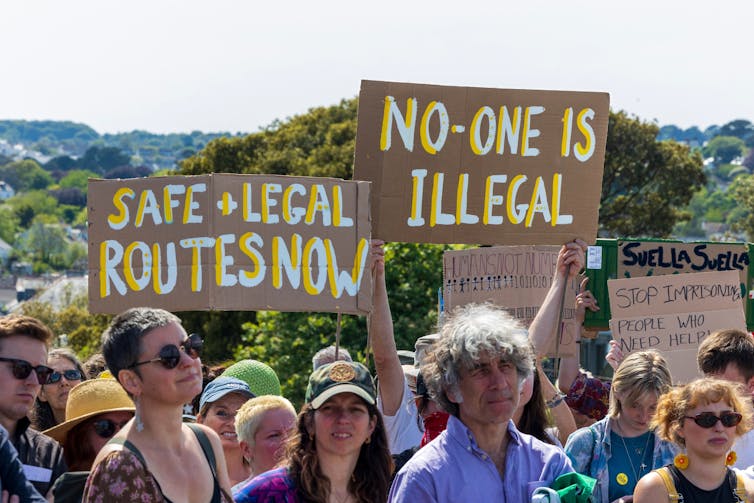
One of Keir Starmer’s first acts as prime minister was to kill off the previous government’s flagship asylum policy. The Rwanda plan was doomed from the start, dogged by legal and political difficulties and culminating in a £320 million bill to the taxpayer with no planes actually taking off.
It was also emblematic of the divisive rhetoric that has accompanied the last 14 years of chaotic and cruel immigration policy. This is most clear in the hostile environment, policies from 2014 and 2016 that focused on demonisation, exclusion and restriction of migrants. The aim was to make life as intolerable as possible for people with no right to be in the UK.
More recently, it occurred through the Illegal Migration Act 2023, which effectively suspended the right to seek asylum and shut down safe and legal routes into the UK. And it was in the divisive language used by recent home secretary Suella Braverman to talk about asylum seekers as an “invasion” at our shores.
Much of the new government’s policy on migration has yet to be announced. But just in the language the Home Office is using, we can already see the beginnings of a more humane conversation.
Notably, the government has dropped the term “illegal migration”, replacing it with “irregular”. This term is favoured by those working in the migration sector to describe the movement of people outside of the formal migration system, but who are still eligible to apply for asylum. And as the barrister and migration blogger Colin Yeo has observed, the position of “minister for countering illegal migration” has been replaced by “minister for border security and asylum”. The role is held by Angela Eagle.
With the Rwanda plan scrapped, the government has pledged to start tackling the backlog of asylum claims that accumulated under the last government. Much of this was due to the passage of the Illegal Migration Act, which effectively warehouses people within the UK with no access to asylum nor ability to be removed.
The act made claims “inadmissible” for people arriving irregularly, which meant that anyone in the category was automatically deemed “illegal” and treated as a criminal.
The onus now appears to be shifting from the migrants to smugglers who have been profiteering from this inhumane trade.
Labour has pledged to “smash the gangs” that have been capitalising off the smuggling of migrants across the English Channel. Over 100,000 migrants have crossed since 2018 with the gangs being highly innovative and adaptive in their business.
The new home secretary, Yvette Cooper, has diverted £75 million from the Rwanda scheme towards a new UK border security command to tackle the root of the gangs and disrupt the “vile trade”.
Labour and the anti-migrant ticket
Bubbling under the surface of all of this is anxiety about the rise of anti-immigration party Reform UK. The party now holds five seats in the House of Commons (and came second in 98 constituencies in the general election).
Some, including former prime minister Tony Blair, have urged the government to lean towards being tough on migration as a way to appease this growing portion of the electorate.
Under Blair, New Labour from 1997-2010 pushed on anti-refugee politics. The focus was on a “fairer, faster, firmer” process where detention, deportation and destitution were central policies. In effect, it was a hostile environment in all but name.
There are some echoes of these policies in the current government’s approach. In May, Starmer gave a speech in Dover where he focused on deterrence, security, counter-terrorism measures and removal.
But crucially, he also made the call for a “quick and humane” new asylum system. And at the recent European leaders summit he spoke of “resetting” the UK approach to migration in a way that respects international law. Most recently, the government has announced that the controversial Bibby Stockholm – an asylum accommodation barge that has raised concerns regarding the wellbeing of those on board – will close next year.

All of this would have been welcome news for refugee and human rights campaigners who have called for a new asylum system blueprint. Their call includes restoring the right to seek asylum, housing people within communities rather than unfit institutional accommodation and giving asylum seekers the right to work.
They have also called for the opening of more safe and legal routes to the UK, beyond the current, limited resettlement schemes. Without such routes, people fleeing hotspots of conflict and violence will continue to be exploited by people smugglers and make dangerous journeys across the Channel.
So far, Labour has not spoken of safe and legal routes. But some aspects of their approach – and at the very least, the way they are speaking about asylum and the border rather than “illegal immigration” – indicate that a more humane conversation is starting to take place.
Gillian McFadyen does not work for, consult, own shares in or receive funding from any company or organisation that would benefit from this article, and has disclosed no relevant affiliations beyond their academic appointment.
This article was originally published on The Conversation. Read the original article.







